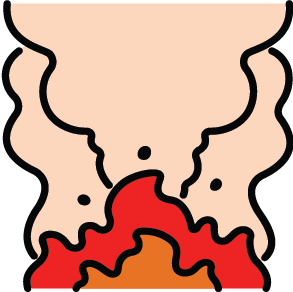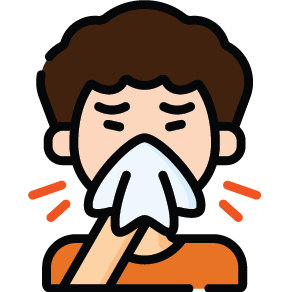Causes of Cough
- Home
- Causes of Cough
Causes of Cough
Causes of Cough

Irritants or allergens
- Smoke.
- Strong smells (like cleaners and perfumes).
- Mold.
- Dust.
- Pollen.
- Pet dander.
- Mucus.
- Certain medications, like the blood pressure medications known as ACE inhibitors.

Medical conditions that can cause acute and subacute cough
- Cold.
- Flu.
- Acute bronchitis or bronchiolitis.
- Sinusitis.
- Pneumonia.
- Whooping cough (also called pertussis).
- Asthma.
- Allergies.
- Acute second- or third-hand smoke exposure.

Medical conditions that can cause chronic cough
- Chronic bronchitis.
- Asthma.
- Allergies.
- Chronic obstructive pulmonary disease (COPD) and other lung conditions.
- Gastroesophageal reflux disease (GERD).
- Throat disorders, including vocal cord disorders.
- Postnasal drip.
- Heart failure and other cardiac conditions.
Acute cough (lasting less than three weeks)
- Lower respiratory tract infections. These are less common, but they can progress to more serious lung infections like bronchitis or pneumonia. Infection with microorganisms may cause several illnesses (viruses, bacteria, or fungi).
- Infections of the upper respiratory tract. These are the most typical causes of sudden coughing fits. They are caused by a germ infection (virus). Without any special therapy, they usually invariably improve within a week. Symptoms can last up to three weeks.
- Asthma. This causes wheezing, shortness of breath, and coughing at night, in cold air, and during exercise. An infection with a germ can exacerbate asthma symptoms significantly. This is known as an asthma exacerbation.
- Irritants – Breathing in smoke or chemical fumes can irritate the airways.
Subacute cough (lasting three to eight weeks)
- Airways that take a long time to recover after an infection. In this situation, the pathogen has vanished, but your airways remain enlarged and irritated, causing you to cough. This is known as airway hyperresponsiveness.
- Other illnesses, such as tuberculosis, might cause a persistent cough (TB).
- The whooping cough.
Chronic cough (lasting more than eight weeks)
- Postnasal drip. When you lie down, the mucus in your nose flows down the back of your throat. Anything that stimulates your nose to produce more mucus can trigger it. Allergies, hay fever, nasal polyps, and infections are all examples of this.
- Asthma. Cough is caused by undiagnosed or undertreated asthma.
- Acid reflux. Stomach acid washes up the food pipe and splashes into the airways.
- Medication side effects. Cough can be caused by angiotensin-converting enzyme (ACE) inhibitor medications, which are used to treat high blood pressure.
- Smoking-related lung illness – chronic obstructive pulmonary disease (COPD).
Coughing and shortness of breath worsen as a result of lung injury. Smokers are primarily affected.

An initiative by Glenmark to educate about everything related to Cough and spread awareness about cough related health conditions.
Quick Links
Contacts
- GLENMARK PHARMACEUTICALS LIMITED Glenmark Corporate Enclave, BD Sawant Marg, Chakala, Off WE Highway, Andheri (E), Mumbai 400099
- Terms & Condition
- Privacy Policy
- Sitemap
- Disclaimer
- Coughology © 2024 All Right Reserved
